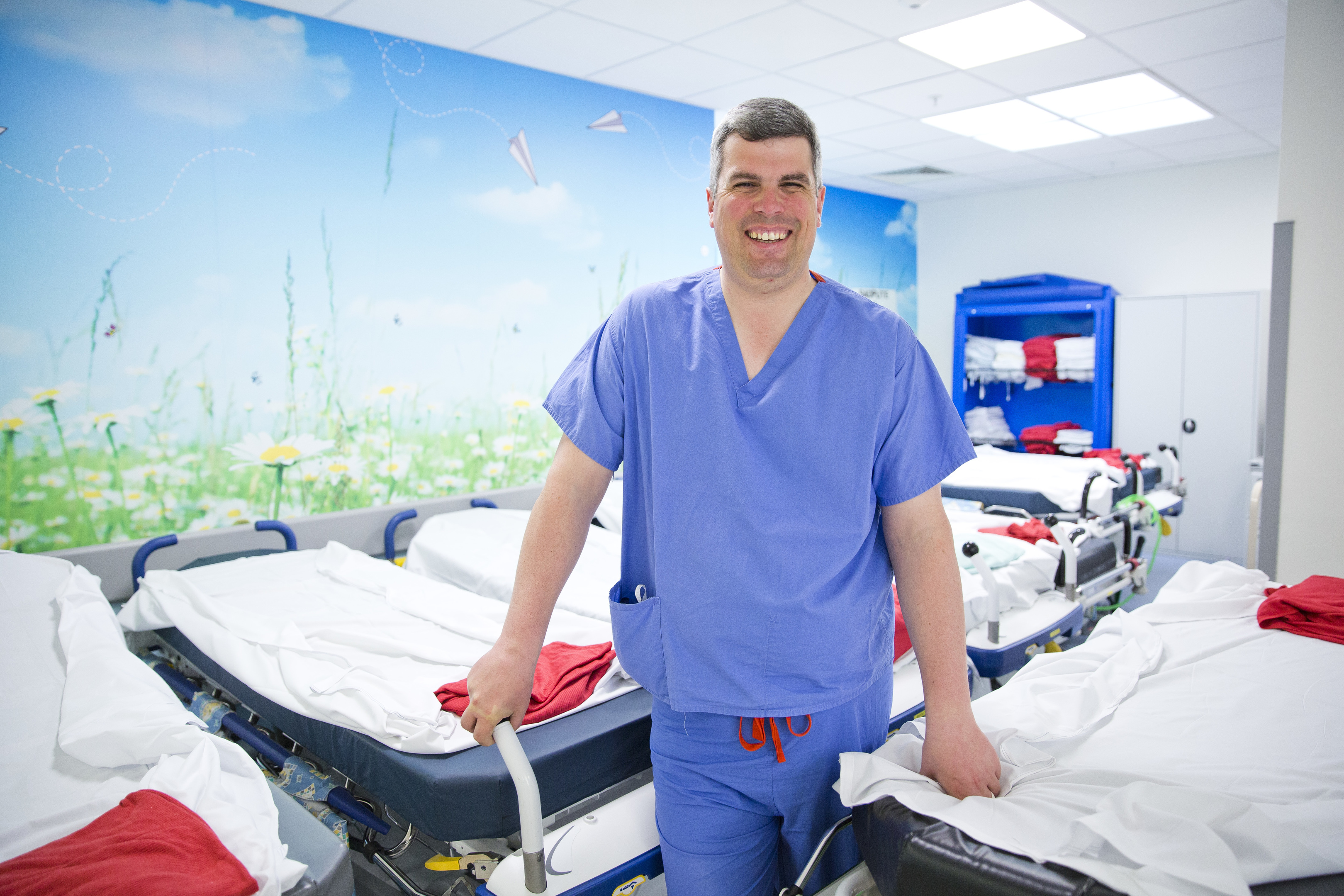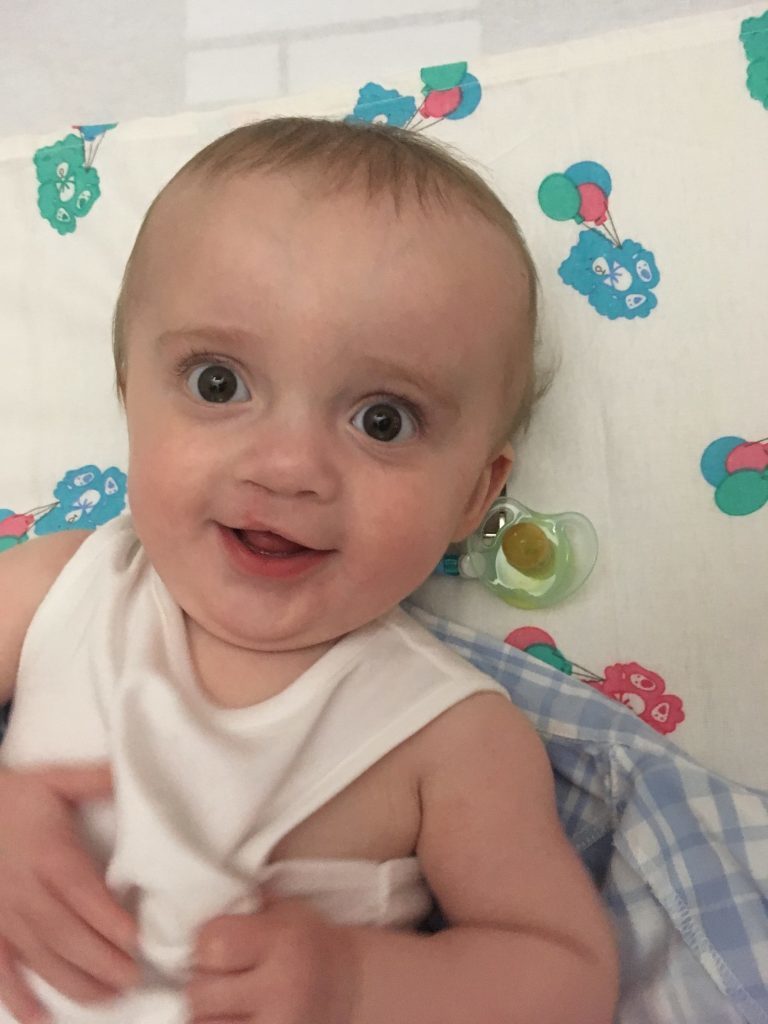
BEAMING for the camera, little Fynn Brands is the baby whose smile is set to melt the nation’s heart.
And its all thanks to the Scottish surgeon who says: “I have the best job in the world – I give children smiles.”
Fynn was born with a cleft lip and palate – a condition which affects around 100 Scots babies every year.
It occurs when structures joining the upper lip and roof of the mouth don’t develop properly in the womb, leaving gaps.
After a couple of operations – one when he was just four months old, another two weeks ago – Fynn’s condition has now been corrected.
It was spotted during a scan, which meant parents Louise and Craig were well prepared for his birth.
Louise said: “When I saw my baby for the first time I thought he was perfect and looked just like his sister, I didn’t focus on the cleft.
“I just saw my beautiful baby boy.”
The adorable baby, now eight months old, can be seen tomorrow night in the second series of Scotland’s Superhospital.
Cameras go behind the scenes at Glasgow’s Queen Elizabeth University Hospital to meet patients and the staff who care for them.
Dr Craig Russell, the consultant plastic surgeon who operated on Fynn, said: “I feel very grateful to do what I do.”
Louise, 34, and electrician Craig, 36, of Gourock, Inverclyde, had wondered why their unborn baby seemed to be so camera-shy.
Louise explained: “I had an ultrasound scan at 12 weeks to assess my risk of having a Down’s Syndrome baby.
“The result showed there was a one in 69 chance, so I went on to have an amniocentesis test, where they take some of the fluid surrounding the foetus in the womb.
“The results showed that my baby was fine.
“But, at a 28-week scan, I told the doctor that, despite this being my third scan, I had never seen my baby’s face.
“So he persevered until Fynn moved his head and we could see quite clearly that his mouth hadn’t developed properly.”
The doctor explained he had a cleft lip and possibly a cleft palate.
The couple, who have two other children – Jack, three, and 19-months-old Olivia – were immediately put in touch with cleft specialists, who visited their house to explain the condition.
“I had a planned caesarean delivery, so I knew my date, and a cleft specialist nurse came with me to Paisley’s Royal Alexandra where I had Fynn,” said Louise.
“I was given special bottles to feed him because babies with cleft lips and palates can’t suckle as easily. They need a bit of help, and these bottles have an easier milk flow.”
Louise and Craig also then met the surgeon entrusted with correcting their baby’s top lip.
Louise said: “He explained how he would repair his lip and what a difference it would make to Fynn.
“It was two weeks before Christmas when they operated and we were so nervous.
“We knew Fynn was in good hands, but he was just so small to be going into an operating theatre.”
But wee Fynn has continued to thrive and, two weeks on from his second bout of surgery, he is now making a complete recovery.
Louise said: “We’ve been bowled over by the care and attention we’ve received for Fynn.
“The specialist cleft team have been phenomenal.
“We’ve had 100% support from the start which has made what could have been a very distressing time for us very straightforward and positive.
“I can see how this could have been a very frightening experience for parents.
“Before Fynn, neither of us knew anything about cleft lips or cleft palates.
“Now we’re just so grateful to the experts for making Fynn’s recovery as easy as possible.”
With around 750,000 patients treated every year at the hospital, day-to-day procedures have to be run with military precision.
An army of operational staff are on hand to oversee everything from patient transport to deliveries.
Scotland’s Superhospital guides viewers around the state-of-the-art facility, meeting patients and staff.
On the Teenage Cancer Trust unit, 18-year-old Connor is weighing up his options. A stem cell transplant could be his best chance of beating acute lymphoblastic leukaemia. It’s a complex procedure which would see Connor in isolation for weeks.
And while Davie Collins loves his job as one of 220 porters who take patients between the 90 wards, taking in 12 floors, 127 corridors and walking an average of 10 to 20 miles every day, he admits that sometimes there’s a price to pay.
Davie said: “My heart sinks when I get a BTM – a ‘body to mortuary’ call. No porter likes doing that. It’s a wee bit sad because you’re taking a person to their place of rest.”
Scotland’s Superhospital, tonight, BBC One Scotland, 9pm.

Enjoy the convenience of having The Sunday Post delivered as a digital ePaper straight to your smartphone, tablet or computer.
Subscribe for only £5.49 a month and enjoy all the benefits of the printed paper as a digital replica.
Subscribe